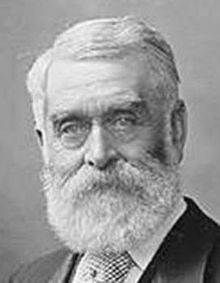William Whiteway
|
The Right Honourable William Whiteway KCMG, PC, KC |
|
|---|---|
 |
|
| Premier of the Colony of Newfoundland | |
|
In office 1878–1885 |
|
| Monarch | Queen Victoria |
| Governor |
John Hawley Glover Henry Berkeley Fitzhardinge Maxse Glover 2nd term |
| Preceded by | Frederick Carter |
| Succeeded by | Robert Thorburn |
| Premier of the Colony of Newfoundland | |
|
In office 1889–1894 |
|
| Monarch | Victoria |
| Governor |
Henry Arthur Blake Terence O'Brien |
| Preceded by | Robert Thorburn |
| Succeeded by | Augustus F. Goodridge |
| Premier of the Colony of Newfoundland | |
|
In office 1895–1897 |
|
| Monarch | Victoria |
| Governor | Herbert Harley Murray |
| Preceded by | Daniel Joseph Greene |
| Succeeded by | James Spearman Winter |
| Solicitor-General of Newfoundland | |
|
In office 1874–1878 |
|
| Member of the House of Assembly of Newfoundland | |
|
In office 1874–1894 |
|
| Member of the House of Assembly of Newfoundland | |
|
In office 1859–1869 |
|
| Personal details | |
| Born |
William Vallance Whiteway April 1, 1828 Buckyett, Littlehempston, Devon, England |
| Died |
June 24, 1908 (aged 80) St. John's, Newfoundland |
| Nationality | Newfoundlander |
| Political party |
Conservative 1859-1885 Liberal 1885-1897 |
| Spouse(s) | Mary Lightbourne (m. 1862, d. 1868) Catherine Anne Davies m. 1872 |
| Children | 3 sons and 3 daughters (including Harriet Louise Whiteway) |
| Occupation | lawyer |
Sir William Vallance Whiteway, KCMG, PC, KC (April 1, 1828 – June 24, 1908) was a politician and three time Premier of Newfoundland.
Born in Littlehempston, Devon, England, Whiteway emigrated to Newfoundland in 1843 and entered the law in 1852. In 1859 he was elected to the House of Assembly as a member of the Conservative Party of Newfoundland and became a supporter of Canadian confederation. He lost his seat in the 1869 election on confederation but returned in 1874 and served as Solicitor-General in the government of Sir Frederick Carter before becoming Premier in 1878 when he succeeded Carter as leader of the Conservatives. He was made a Queen's Counsel in 1865. While serving as Solicitor-General, Whiteway was one of the counsel representing the British Government before the Halifax Fisheries Commission, which adjudicated a dispute over north Atlantic fishing rights between the British Empire and the United States. The Commission gave an award of $5,500,000 to be paid by the United States to the British Government. Newfoundland received $1,000,000 as its share of the award.
Whiteway's major policy ambition was the construction of the transinsular railway spanning the island which was begun in 1881 and which he believed would spur economic development of the colony. In 1885 his Conservative party was destroyed by sectarian riots at Harbour Grace which resulted in several Protestants leaving the Whiteway government in protest over its conciliatory attitude towards Catholics. Leading the dissenters was James Spearman Winter, Whiteway's Solicitor-General and grand master of Newfoundland's Orange Order.
...
Wikipedia
